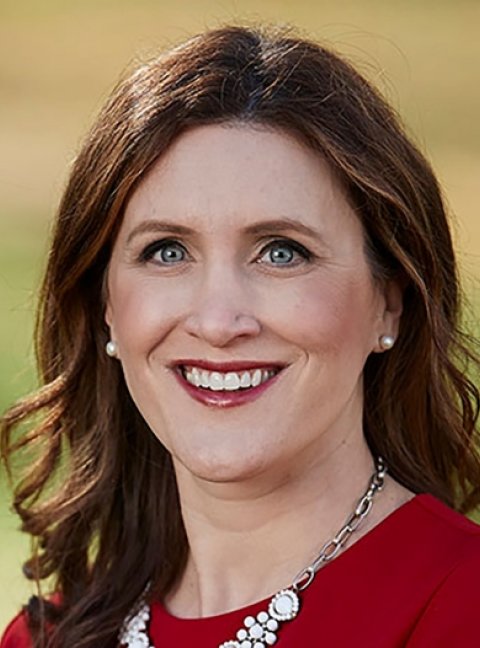Dr. Ed Neukrug, Executive Director
Batten Endowed Chair of Counseling
Department of Counseling and Human Services
Darden College of Education & Professional Studies
Old Dominion University
Dr. Neukrug was born and raised in New York City and obtained his B.A. in psychology from SUNY Binghamton, his M.S. in counseling from Miami University of Ohio, and his doctorate in counselor education from the University of Cincinnati.
After teaching and directing a graduate program in counseling at Notre Dame College in New Hampshire, Dr. Neukrug accepted a position at Old Dominion University, in Norfolk, Virginia where he currently is a Professor of Counseling and the Batten Endowed Chair of Counseling in the Darden College of Education and Professional Studies. He has received numerous awards and accolades over the years, including twice being the recipient of the prestigious President's Award from the National Organization of Human Services, being named a Fellow by the American Counseling Association (ACA), and being bestowed the Hohenshil Publications Award by ACA.
Dr. Neukrug has worked as a counselor at a crisis center, an outpatient therapist at a mental health center, an associate school psychologist, a school counselor, and as a private practice psychologist and licensed professional counselor. He has held a variety of positions in professional associations in counseling and human services and has published dozens of articles, book chapters, and related publications. Dr. Neukrug has also developed several helping and counseling videos, an interactive and animated website entitled Great Therapists of the Twentieth Century, a survey to assess one's theoretical orientation toward counseling, oral stories by well-known people of some of the famous therapists of the 20th century, and more. These materials can be found on the home page of this site under "Resources."
Dr. Neukrug is well known for the multiple editions of his 14 books, most of which can be found on this website. They include: (1) The Dictionary of Counseling and Human Services, (2) Skills and Techniques for Human Service Professionals (2nd ed.), (3) Counseling Theory and Practice (3r ed.), (4) The World of the Counselor (6th. ed.), (5) Experiencing the World of the Counselor: A Workbook for Counselor Educators and Students (4th ed.), (6) Theory, Practice and Trends in Human Services: An Introduction to An Emerging Profession (7th ed.), (7) Essentials of Testing and Assessment for Counselors, Social Workers, and Psychologists (3rd ed., enhanced version), (8) A Brief Orientation to Counseling: Professional Identity, History, and Standards (3rd. ed.), (9) Skills and Tools for Today's Counselors and Psychotherapists, (10) Counseling and Helping Skills: Critical Techniques for Becoming a Counselor, (11) The SAGE Encyclopedia of Theory in Counseling and Psychotherapy, (12) Contemporary Theories of Counseling, and (13) Foundations of Clinical Mental Health Counseling: Professional and Clinical Issues. Dr. Neukrug is also finishing up a book tentatively titled: Psychopharmacology and Brain Transforming Interventions for Mental Health Professionals. Dr. Neukrug has two children, Hannah and Emma.
- Neukrug, E., & Britton, B. (In press). Psychopharmacology and related brain transforming interventions for mental health professionals. Cognella Academic Press.
- Neukrug, E. S. (2025). Theory, practice, and trends in human services: An introduction (7th ed.). Cengage Learning.
- Neukrug, E. (2024). Foundations of Clinical Mental Health Counseling: Professional and clinical issues. Cognella Academic Press.
- Neukrug, E. S., & Hays, D. G. (2023). Counseling theory and practice (3rd ed.). Cognella Academic Publishing.
- Neukrug, E. S. (2022). A brief orientation to counseling: Professional identity, history, and standards (3rd ed.). Cognella Academic Press.
- Neukrug, E. (2022). The world of the counselor (6th ed.). Cognella Academic Press. (Formerly published by Cengage)
- Neukrug, E. (Ed.) (2021). Contemporary theories of counseling and psychotherapy. Cognella Academic Publishing.
- Neukrug, E. (2021). Skills and techniques for human service professionals: Counseling environment, helping skills, treatment issues (2nd ed). Cognella Academic Press. (Formerly published by Cengage)
- Neukrug, E., Kalkbrenner, M., & Snow, K. (2021). Dictionary of counseling and human services. Cognella Academic Publishing.
- Neukrug, E. S., & Fawcett, R. C. (2020). Essentials of testing and assessment: A practical guide for counselors, social workers, and psychologists (3rd ed., enhanced version). Cengage Learning.
- Neukrug, E. (2019). Counseling and helping skills: Critical techniques to becoming a counselor. Cognella Academic Publishing.
- Neukrug, E. (Ed.). (2015). The SAGE encyclopedia of theory in counseling and psychotherapy (Vol 1. and Vol. 2). SAGE Publications.
- Neukrug E. S. (2012). Experiencing the world of the counselor: A workbook for counselor educators and students (4th ed.). Cengage.
- Neukrug, E.S., & Schwitzer, A. (2006). Skills and tools for today's professional counselors and psychotherapists: From Natural Helping to Professional Counseling. Cengage.
Book Chapters
- Neukrug, E., & Kibulus, R. (2024). Clinical mental health work settings. In E. Neukrug (Ed.), Foundations of clinical mental health counseling: Professional and clinical issues (pp. 63-86). Cognella Academic Press.
- Neukrug, E., & Woods, E. (2024). Abnormal (Atypical) behavior, diagnosis, and psychopharmacology. In E. Neukrug (Ed.), Foundations of clinical mental health counseling: Professional and clinical issues (pp. 149-170). Cognella Academic Press.
- Neukrug, E., & Franklin, J. (2024). Developing and evaluating mental health counseling programs. In E. Neukrug (Ed.), Foundations of clinical mental health counseling: Professional and clinical issues (pp. 229-245). Cognella Academic Press.
- Neukrug, E. (2023). Balancing my personal and professional life: My self-care “it factors.” In G. Corey, M., Muratori, M., J. T. Austin, & J. A. Austin. Counselor self-care (pp. 168-169). John Wiley & Sons.
- Neukrug, E., & Dice, T. (2023). So funny I forgot to laugh! Deans and chairs nailing or failing humor in leadership. In K. Vaidya (Ed.). Lead with a sense of humor: Why (and how to) be a funnier and more effective educational leader and laugh all the way to your institution.” Curious Academic Publishing. In process.
- Neukrug, E. (2024). Balancing my personal and professional life: My self-care “it factors.” In G. Corey, Muratori, M., Austin, J. T., Austin, J. A. (Ed.), Counselor self-care. American Counseling Association.
- Neukrug, E. (2022). Humor, storytelling, and related techniques to improve focus, build rapport, and increase learning. In K. Vaidya (Ed.). Teach counseling with a sense of humor [Vol. 1]: Why (and how to) be a funnier and more effective counseling educator and laugh all the way to your institution. Curious Academic Publishing
- Neukrug, E., & Snow, K. (2021). Contemporary psychodynamic therapy. In E. Neukrug (Ed.), Contemporary theories of counseling and psychotherapy (pp. 1-35). Cognella Academic Press.
- Neukrug, E., & Pope, A. (2021). Contemporary person-centered counseling. In E. Neukrug (Ed.), Contemporary theories of counseling and psychotherapy (pp. 36-71). Cognella Academic Press.
- Neukrug, E. (2021). Cognitive-behavioral therapy. In E. Neukrug (Ed.), Contemporary theories of counseling and psychotherapy (pp. 72-111). Cognella Academic Press.
- Neukrug, E. (2021). Integrative post-modern therapy. In E. Neukrug (Ed.), Contemporary theories of counseling and psychotherapy (pp. 112-145). Cognella Academic Press.
- Neukrug, E. (2018). Balancing my personal and professional life: My self-care “it factors.” In G. Corey, M., Muratori, M., J. T. Austin, & J. A. Austin. Counselor self-care (pp. 134-135). John Wiley & Sons.
- Bayne, H., & Neukrug, E. (2017). Metaphors for empathy: Getting into character. In S. E. Stewart-Spencer & C. J. Dean, C. J. (Eds.), Metaphors and therapy: Enhancing clinical supervision and education (pp. 80-88). Independent Therapy Ink, LLC.
- Neukrug, E., & Polychronopoulos, G. (2015). Poor supervising or impaired student? In B. Herlihy & G. Corey (Eds.), Ethical standards casebook (7th ed., pp. 264-268). American Counseling Association.
- Neukrug, E. (2015). Introduction. In E. Neukrug (Ed.), The SAGE encyclopedia of theory in counseling and psychotherapy (Vol. 1, pp. xxxvix-xliii). SAGE Publishing.
- Neukrug, E. (2015). Cautious, Dangers, and/or illegal practices: Overview. In E. Neukrug (Ed.), The SAGE encyclopedia of theory in counseling and psychotherapy (Vol. 1, pp. 149-151). SAGE Publishing.
- Neukrug, E. (2015). Person-centered counseling. In E. Neukrug (Ed.), The SAGE encyclopedia of theory in counseling and psychotherapy (Vol. 2, pp. 767-772). SAGE Publishing.
- Neukrug, E., & Ellis, D. (2015). Albert Ellis. In E. Neukrug (Ed.), The SAGE encyclopedia of theory in counseling and psychotherapy (Vol. 1, pp. 333-335). SAGE Publishing.
- Neukrug, E. (2015). Prolonged exposure therapy. In E. Neukrug (Ed.), The SAGE encyclopedia of theory in counseling and psychotherapy (Vol. 2, pp. 806-808). SAGE Publishing.
- Neukrug, E. (2015). Existential-humanistic therapies: Overview. In E. Neukrug (Ed.), The SAGE encyclopedia of theory in counseling and psychotherapy (Vol. 1, pp. 374-379). SAGE Publishing.
- Neukrug, E. (2015). Foundational therapies: Overview. In E. Neukrug (Ed.), The SAGE encyclopedia of theory in counseling and psychotherapy (Vol. 1, pp. 426-432). SAGE Publishing.
- Neukrug, E. (2015). From the client’s voice: A post-modern, social constructionist perspective on ethical decision-making. In G. Corey & B. Herlihy (Eds.). Boundary issues in counseling: Multiple roles and responsibilities (3rd ed., 69-76). Cengage.
- Neukrug, E. (2015). Making ethical decisions when faced with thorny boundary issues. In G. Corey & B. Herlihy (Eds.). Boundary issues in counseling: Multiple roles and responsibilities (3rd ed., 22-26). Cengage.
- Neukrug, E. (2014). Psychiatric/psychological assessment. In L. H. Cousins & J. G. Golson (Eds.), Encyclopedia of human services and diversity (Vol. 3, pp.1071-1075). Thousand Oaks, CA: SAGE Publishing.
- Milliken, T., Neukrug, E., Dustin, J., & Craigen, L. (2014). The Journal of Human Services. In L. H. Cousins & J. G. Golson (Eds.), Encyclopedia of human services and diversity (Vol. 2, pp. 759-760). SAGE Publishing.
- Neukrug, E., & Neukrug, H. (2014). Heidi: Intervention involving possible homelessness, addiction, and abuse. In R. Rosenthal (Ed.), Encyclopedia of human services: Master review and tutorial for the human services-board certified practitioner examination (HS-BCPE) (pp. 178-179). Routledge.
- Neukrug, E., & Neukrug, H. (2014). Henry: Responding to a schizophrenic client. In R. Rosenthal (Ed.), Encyclopedia of human services: Master review and tutorial for the human services-board certified practitioner examination (HS-BCP) (pp. 180-182). Routledge.
- Neukrug, E. (2011). Support and challenge: Use of metaphor as a higher level empathic response. In H. Rosenthal, Favorite counseling and therapy techniques (2nd ed., pp. 237-240). Taylor and Francis.
- Neukrug, E. (2009). Aptitude Testing. Encyclopedia of Counseling (pp. 27-28). American Counseling Association.
- Neukrug, E. (2009). Client-centered counseling. Encyclopedia of Counseling (pp. 100-101). American Counseling Association.
- Neukrug, E., & Remley, T. (2009). Key historical events in professional identity and ethics. Encyclopedia of Counseling. (411-413). American Counseling Association.
- Neukrug, E. S. (2006). Five steps to the perfect semester. The Brooks/Cole counseling e-communicator [Electronic version], 5(1). Wadsworth Publishing.
- Neukrug, E. S. (2004). Challenging the leader. In L.E. Tyson, R. Perusse, & J. Whitledge (Eds.), Critical incidents in group counseling. American Counseling Association.
- Neukrug, E. S. (2004). Hostile member. In L.E. Tyson, R. Perusse, & J. Whitledge (Eds.), Critical incidents in group counseling. American Counseling Association.
- Neukrug, E. (2001). Variety is the spice of life: A developmental and diagnostic approach to choosing homework assignments. In H. Rosenthal (Ed.), Favorite counseling and therapy homework assignments: Leading therapists share their most creative strategies (pp. 161-165). Brunner-Routledge.
- Neukrug, E. (2001). Medical breakthroughs: Genetic research and genetic counseling. Psychotropic medications, and the mind-body connection. In T. McClam & M. Woodside (Eds.), Human service challenges in the 21st century (pp. 115-132). Ebsco Media.
- Neukrug, E. (2000). Professional issues in counseling. In N. Brown (Ed.), Home study materials for the licensed professional counselors’ exam and the national counselors exam.
- Neukrug, E. (2000). Testing and appraisal. In N. Brown (Ed.), Home study materials for the licensed professional counselors’ exam and the national counselors’ exam.
- Neukrug, E. (1998). Support and challenge: Use of metaphor as a higher-level empathic response. In H. Rosenthal (Ed.), Favorite counseling and therapeutic techniques: 51 therapists share their most creative strategies (pp. 139-141). Accelerated Development.
- Neukrug, E., (1995). The career rating scale. Landmark publishing.
- Neukrug, E. (1988). Program Evaluation. In J. D. Randall (Ed.), New Hampshire comprehensive guidance and counseling program: A guide to an approved model for program development (pp. 55-74). Plymouth State College.
National Articles
- Kalkbrenner, M., Neukrug, E., & Esquivel, L. E. (2022). Mental health literacy screening on students in Hispanic serving institutions. Journal of Counseling and Development, 100(3), 319-329. https://doi.org/10.1002/jcad.12428
- Carlisle, K., Levitt, D., & Neukrug, E. (2022). Mental health counselors’ perceptions of ethical behaviors. Counseling and Values, 67(1), 88-115. https://doi.org/10.1163/2161007X-67010005
- Kalkbrenner, M. T., Goodman-Scott, E., & Neukrug, E. (2020). Validation of high school students’ scores on the revised fit, stigma, and value scale: Implications for school counseling screening. Professional School Counseling, 23(1), 1-10. doi:10.1177/2156759X20912750
- Carlisle, K., Neukrug, E., Pribesh, S., & Krahwinkel, J. (2019). Personality, motivation, and internet gaming disorder: Conceptualizing the gamer. The Journal of Addictions and Offender Counseling, 40, 107-122. doi:10.1002/jaoc.12069
- Kalkbrenner, M., & Neukrug, E. (2019). The utility of the revised Fit, Stigma, and Value Scale with counselor trainees: Implications for enhancing clinical supervision. The Clinical Supervisor, 38, 262-280. https://doi.org/10.1080/07325223.2019.1634665
- Kalkbrenner, M. T., Neukrug, E., & Griffith, S. A. (2019). Appraising counselor attendance in counseling: The validation and application of the revised fit, stigma, and value scale. Journal of Mental Health Counseling, 41(1), 21-35. https://doi.org/10.17744/mehc.41.1.03.
- Kalkbrenner, M., & Neukrug, E. (2018). Identifying barriers to attendance in counseling among adults in the United States: Confirming the factor structure of the Revised Fit, Stigma, and Value Scale. The Professional Counselor, 8(3), 282-296. https://doi:10.15241/mtk.8.4.299
- Neukrug, E., Kalkbrenner, M., & Griffith, S. (2018). Is counseling for you? Social Work Helper. Retrieved from https://www.socialworkhelper.com/2018/02/18/is-counseling-for-you/
- Neukrug, E., Kalkbrenner, M. T., & Griffith, S. A. (2017). Barriers to counseling among human service professionals: The development and validation of the fit, stigma, & value (FSV) scale. Journal of Human Services, 37, 27-40.
- Neukrug, E. (2017, October 24). Eight characteristics of the effective person. Social Work Helper. Retrieved from https://www.socialworkhelper.com/2017/10/24/eight-characteristics-effective-person/
- Neukrug, E. (2017, February 2). Creative and novel approaches to empathy. Counseling Today. Retrieved from http://ct.counseling.org/2017/02/creative-novel-approaches-empathy/
- Neukrug, E., Sparkman, N., & Moe, J. (2017). The Holland code of members of the national organization of human services: A preliminary study of human service professionals. Journal of Employment Counseling, 54(4), 146-155. doi:10.1002/joec.12063
- Sparkman-Key, N., & Neukrug, E. (2016). Inclusion of “human service professional” in the standard occupational classification system.” Journal of Human Services, 36, 71-74.
- Neukrug, E. S., Gleason, B., Craigen, L., Dustin, J., & Milliken, T. (2014). Introduction to the special section on current issues. Journal of Human Services, 34, 104-110.
- Sparkman, N., & Neukrug, E. (2014). Perceptions of the HS—BCP credential: A survey of human service professionals. Journal of Human Services, 34, 24-37.
- Peterson, C., Lomas, G., Neukrug, E., & Bonner, M. (2014). Assessment use by counselors in the United States: Implications for policy and practice. Journal of Counseling and Development, 92, 90-98.
- Neukrug, E., Peterson, C., Bonner, M., & Lomas, G. (2013). A national survey of assessment instruments taught by counselor educators. Counselor Education and Supervision, 52, 207-221
- Neukrug, E., Britton, B., & Crews, C. (2013). Common health-related concerns of men and their implications for counselors. Journal of Counseling and Development, 91, 390-397.
- Bayne, H., Neukrug, E., Hays, D., & Britton, B. (2013). A comprehensive model for optimizing empathy in person-centered care. Patient Education and Counseling, 93(2), 209-215.
- Neukrug, E., Bayne, H., Dean-Nganga, L., & Pusateri, C. (2013). Creative and novel approaches to empathy: A neo-Rogerian perspective. Journal of Mental Health Counseling, 35(1), 29-42. https://doi.org/10.17744/mehc.35.1.5q375220327000t2.
- Neukrug, E., & Milliken, T. (2011). Counselors’ perceptions of ethical behaviors. Journal of Counseling and Development. 89, 206–216.
- Rockinson-Szapkiw, A. J., Baker, J. D., Neukrug, E., & Hanes, J. (2010). The efficacy of computer mediated communication technologies to augment and support effective online helping profession education. Journal of Technology in Human Services, 28(3), 161-177.
- Neukrug, E., & Milliken, T. (2010). Standards in human services. An introduction to the special section on standards in the Journal of Human Services, Journal of Human Services, 30, 5-7.
- Neukrug, E., Cichetti, R., Forman, J., Kyser, N., McBride, R., & Wisinger, S. (2009). A content analysis of CESNET-L E-mail messages: Directions for information delivery in higher education. Journal of Computing in Higher Education, 22, 60-72.
- Milliken, T., & Neukrug, E. (2009). Perceptions of ethical behaviors of human service professionals. Human Service Education, 29, 35-48.
- Baker, S. R., Robinson, J. E., Danner, M. J. E., & Neukrug, E. (2001). Community social disorganization theory applied to adolescent academic achievement (Report No. UD034167). (ERIC Document Reproduction Service No. ED453301).
- Neukrug, E., Milliken, T., & Shoemaker, J. (2001). Counselor seeking behaviors of NOHSE practitioners, educators, and trainees. Human Service Education, 21, 45-58
- Neukrug, E., & Milliken, T., & Walden, S. (2001). Ethical practices of credentialed counselors: An updated survey of state licensing boards. Counselor Education and Supervision, 41(1), 57-70.
- Neukrug, E. (1996). Special feature: Ethical standards of human service professionals. Human Service Education, 16, 11-17.
- Neukrug, E. (1996). A developmental approach to teaching ethical decision making. Human Service Education, 16, 19-36.
- Neukrug, E., Lovell, C., & Parker, R. (1996). Employing ethical codes and decision-making models: A developmental process. Counseling and Values, 40, 98-106.
- Schwab, R., & Neukrug, E. (1994). A survey of counselor educators' values on ethical concerns. Counseling and Values, 39(1), 42-55.
- Neukrug, E. (1994). Understanding diversity in a pluralistic world. The Journal of Intergroup Relations, 21(2), 3-12.
- Neukrug, E., & McAuliffe, G. (1993). Cognitive development and human service education. Human Service Education. 13, 13-26.
- Neukrug, E., Barr, C., Hoffman, L., & Kaplan, L. (1993). Developmental counseling and guidance: A model for use in your school. The School Counselor, 40, 356-362.
- Neukrug, E., & Williams, G. (1993). Counseling counselors: A survey of values. Counseling and Values, 38(1), 51-62.
- Jagger, L., Neukrug, E., & McAuliffe, G. (1992). Congruence between personality traits and chosen occupation as a predictor of job satisfaction for people with disabilities. Rehabilitation Counseling Bulletin, 36, 53-60.
- Neukrug, E., Healy, M., & Herlihy, B. (1992). Ethical practices of licensed professional counselors: An updated survey of State licensing boards. Counselor Education and Supervision, 32(2), 130-141.
- Neukrug, E., & Barr, C. (1991). The status of elementary school counseling in Virginia. Education, 111(2), 178-180.
- Neukrug, E. (1991). Computer-assisted live supervision in counselor skills training. Counselor Education and Supervision, 31(2), 132-139.
- Neukrug, E., Goddard, R., Skinner, K., & Heden, R. (1985). A model for counselor transformation. The School Counselor, 32(2), 190-194.
State Articles (Refereed)
- Neukrug, E. (1996). Review of Perlstein’s & Thrall’s ready-to-use conflict resolution activities for secondary students. Virginia Counselors Journal.
- Neukrug, E., & Sowala, R. (1992). The counselor's counselor: Frequency of attendance in counseling of VCA counselors. Virginia Counselors Journal, 20, 20-31.
- Neukrug, E. (1992). The supervisor's dilemma: Allegiance to counselor or client? New Hampshire Journal for Counseling and Development, 20, 11-12.
- Neukrug, E., & Barr, C. (1991). Elementary school counseling: History, current status in Virginia, and a look toward the future. The Virginia Counselors Journal, 19, 27-33.
- Neukrug, E. (1990). Adult cognitive development: Implications for counselor training and counselor growth. New Hampshire Journal for Counseling and Development, 18(1), 5-8.
- Goddard, R., & Neukrug, E. (1988). The effect of aerobic exercise on anxiety, depression, and self-actualizing values. New Hampshire Journal for Counseling and Development, 16(1), 11-14.
- Neukrug, E. (1987). The brief training of paraprofessional counselors in empathic responding. New Hampshire Journal for Counseling and Development, 15(1), 15-19.
- Neukrug, E., & Goddard, R. (1985). Life as a function of death: Where do we go from here? New Hampshire Journal for Counseling and Development, 13(1), 29-33.
- Neukrug, E. (l985). A professional development survey of New Hampshire school counselors. New Hampshire Journal for Counseling and Development, 13(1), 9 - 14.
- Neukrug, E. (1982). An historical review of empathy in the 20th century. New Hampshire Personnel and Guidance Journal, 10(1), 6-9.
- Neukrug, E. (2023). 50 counseling skills role plays for human service professionals to match the skills in Neukrug’s book: Skills and Techniques for Human Service Professionals.
- Neukrug, E. (2023). 50 counseling skills role plays for counselors to match the skills in Neukrug’s book: Counseling and helping skills: Critical techniques to becoming a counselor
- Neukrug, E. (2018). In E. Neukrug (Editor/Director), 13 role-plays of counseling theories to match the theories in Neukrug books, Counseling Theory and Practice. Introduction by Tim Seibles.
- Neukrug, E. (2018). Role-play with Angela and Jake Miller. Four role-plays: Psychodynamic, existential-humanistic, cognitive-behavioral, and post-modern. Introduction by Tim Seibles.
- Neukrug, E. (2018). Introduction to 13 counseling theories. Stories about each theorist told by Dr. Ed Neukrug.
- Neukrug, E., (2011-present). Great therapists of the twentieth century (GTTC), Interactive website which presents seventeen animated famous therapists and their theories. See https://silver.odu.edu/psyadm/
- Neukrug, E. (2010). Development of on-line survey to assess view of human nature. See http://ww2.odu.edu/~eneukrug/therapists/booksurvey.html
- Neukrug, E. (2010). Development of on-line “Galton’s Board” for testing class. See http://ww2.odu.edu/~eneukrug/galton.htm
- Neukrug, E. (2010). Stories of the Great Therapists. A conglomeration of personal stories about famous therapists. See: www.odu.edu/~eneukrug/therapists/index.shtml
- Neukrug, E. (2007). Producer. Twelve video clips demonstrating twelve counseling techniques. Belmont, CA: Brooks/Cole. DVD and web based.
- Schwitzer, A., Neukrug, E., & Nicholas, K. (2006). DVD to accompany skills and tools for today's professional counselors and psychotherapists: From Natural Helping to Professional Counseling. Pacific Grove: Brooks/Cole.

Dr. Danica Hays
Dean & Professor
University of Nevada, Las Vegas

Dr. Bruce Wampold
Emeritus Professor
University of Wisconsin—Madison; Former Director, Research Institute, Modum Bad Psychiatric Center, Norway; Chief Scientist, Skillsetter.com

John C. Norcross, Ph.D, ABPP
Distinguished Professor & Chair of Psychology, University of Scranton. Clinical Professor of Psychiatry, SUNY Upstate Medical University.



